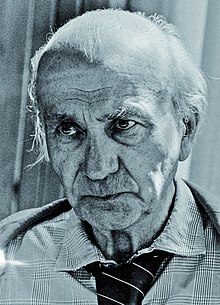Gyula Illyés
| Illyés Gyula | |
|---|---|
 |
|
| Born |
2 November 1902 Sárszentlőrinc, Tolna County |
| Died | 15 April 1983 (aged 80) Budapest |
| Nationality | Hungarian |
| Spouse | Irma Juvancz (married 1931) Flóra Kozmutza (married 1939) |
| Relatives | Father: János Illés Mother: Ida Kálley Daughter: Maria |
Gyula Illyés (2 November 1902 – 15 April 1983) was a Hungarian poet and novelist. He was one of the so-called népi ("from the people") writers, named so because they aimed to show – propelled by strong sociological interest and left-wing convictions – the disadvantageous conditions of their native land.
He was born the son of János Illés (1870 – 1931) and Ida Kállay (1878 – 1931) in Tolna County. His father belonged to a rich gentry family, but his mother came from the most deprived segment of society, agricultural servants. He was their third child and spent his first nine years at his birthplace, where he finished his primary school years (1908 – 1912) and when his family moved to Simontornya, he continued his education at grammar schools there and Dombóvár (1913 – 1914) and Bonyhád (1914 – 1916). In 1926 his parents separated, and he moved to the capital with his mother. He continued senior high school at the Budapest Munkácsy Mihály street gimnazium (1916 – 1917) and at the Izabella Street Kereskedelmi school (1917 – 1921). In 1921 he graduated. From 1918 to 1919 he took part in various left-wing student and youth worker's movements, being present at an attack on Romanian forces in Szolnok during the Hungarian Republic of Councils. On 22 December 1920 his first poem was published (El ne essél, testvér) anonymously in the Social Democrat daily Népszava.
He began studies at the Budapest University's department of languages studying Hungarian and French. Due to illegal political activities he was forced to escape to Vienna in December that year, moving on to Berlin and the Rhineland in 1922.
Illyés arrived in Paris in April that year. He did numerous jobs including as a bookbinder. For a while he studied at the Sorbonne and published his first articles and translations in 1923. He became friends with the French surrealists, among them Paul Éluard, Tristan Tzara and René Crevel (each visited him later in Hungary).
...
Wikipedia
